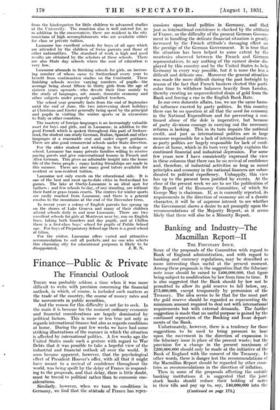Finance—Public & Private
The Financial Outlook
THERE was probably seldom a time when it was more difficult to write with precision concerning the financial outlook, in which, of course, is included such matters as the trade of the country, the course of money rates and the movements in public securities.
And the reason for this difficulty is not far to seek. In the main it is because for the moment ordinary economic and financial considerations are largely dominated by political factors. This is more or less true not only as regards international finance but also as regards conditions at home. During the past few weeks we have had some striking illustrations of the manner in which the situation is affected by international politics. A few weeks ago the United States made such a gesture with regard to War Debts that it was possible to take a hopeful view of the industrial and financial outlook all over the world. It soon became apparent, however, that the psychological effect of President Hoover's offer, with all that it might have meant to a revival of confidence throughout the world, was being spoilt by the delay of France in respond- ing to the proposals, and that delay, there is little doubt, must be traced to political rather than to economic con- siderations.
Similarly, however, when we turn to conditions in Germany, we find that the attitude of France has reper- "cussions upon local politics In Germany, and that just as international confidence is checked by the attitude of France, so the difficulty of the present German Govern- ment in handling the delicate financial situation is greatly increased by the French attitude's damaging effect on the prestige of the German Government. It is true that the situation has- been helped to some extent by, the courtesies observed between the French and German representatives, to say nothing of the earnest desire dis- played by this country and by the United States to help Germany in every way possible, but -it is none the less, a difficult and delicate one. Moreover the general situation was made the more difficult during the past fortnight by reason of the fact that French bankers elected this parti- cular time to withdraw balances heavily from London, thereby creating an unprecedented drain of gold from the Bank and forcing a rise in the English Bank Rate.
In our own domestic affairs, too, we see the same harm- ful influence exerted by party politics. In this country there can be no question at all that the need for economy in the National Expenditure and for preventing a con- tinued abuse of the dole is imperative, but because of party divisions courage in carrying out the necessary reforms is. lacking. This in its turn impairs the national credit, and just as international politics are in large measure responsible for a lack of international confidence, so party politics are largely responsible for lack of confi- dence at home, which in its turn very largely explains the continued financial and industrial depression. For some few years now I have consistently expressed the view in these columns that there can be no revival of confidence and, therefore, of industrial activities so long as sound principles and economy in the national finances are subor- dinated to political expediency. Unhappily, this view has up to the present been justified by events. At the close of the present week we are to see the publication of the Report of the Economy Committee, of which Sir George May is chairman. If, as is currently reported, its requirements in the direction of economy are of a drastic character, it will be of supreme interest to see whether the Government shows a desire to act promptly upon the recommendations of the Majority Report, as it seems likely that there will also be a Minority Report.


































 Previous page
Previous page